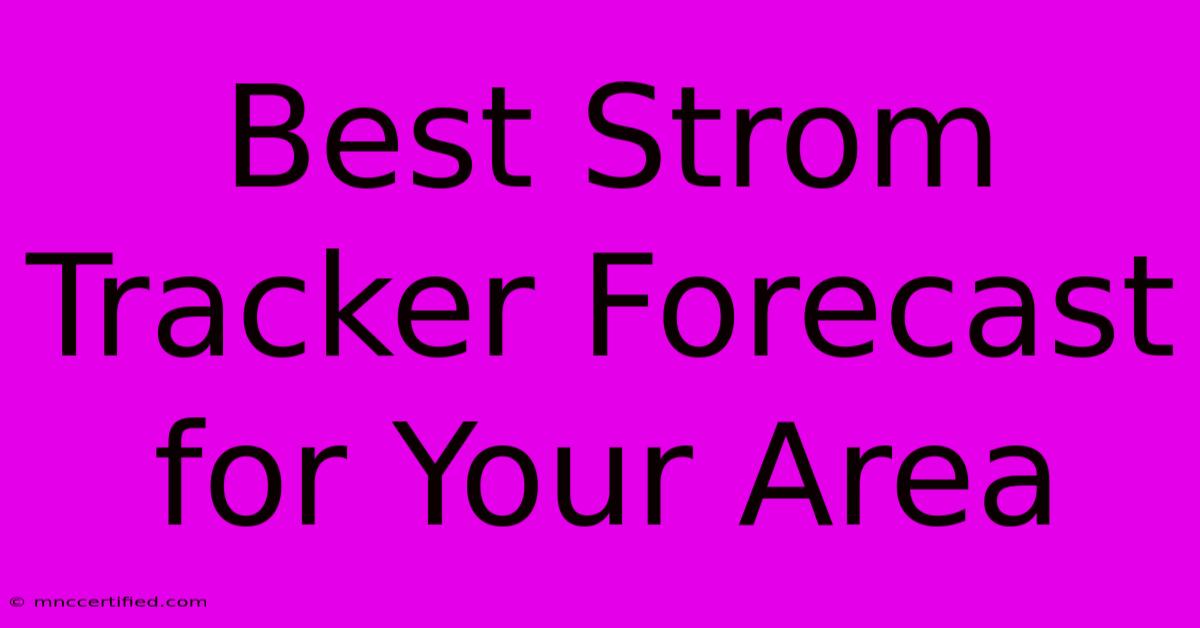Best Strom Tracker Forecast For Your Area

Table of Contents
Best Storm Tracker Forecast for Your Area: Stay Safe & Informed
Staying informed during severe weather is crucial for your safety and the safety of your loved ones. Knowing which storm tracker forecast is best for your specific area can mean the difference between being prepared and being caught off guard. This guide will help you find the most accurate and reliable sources for storm tracking information, ensuring you're always one step ahead of the storm.
Understanding Your Needs: Choosing the Right Storm Tracker
The "best" storm tracker isn't a one-size-fits-all solution. The ideal tool depends on your location, the type of weather you're tracking (hurricanes, tornadoes, blizzards, etc.), and your preferred method of receiving alerts. Consider these factors:
Location Specificity: Hyperlocal vs. National Forecasts
- National Weather Service (NWS): The NWS provides the gold standard for weather forecasting in the United States. Their website (weather.gov) offers detailed forecasts, warnings, and radar imagery. It’s a fantastic starting point for anyone needing reliable, government-backed information. Keyword: National Weather Service
- Local News Stations: Local news channels invest heavily in their meteorology teams and often provide more localized forecasts and real-time updates, including live radar imagery and on-the-ground reporting. Keyword: Local News Weather
- Hyperlocal Weather Apps: Apps like WeatherBug, AccuWeather, and The Weather Channel often offer hyperlocal forecasts, down to your specific street address. However, always cross-reference with the NWS for critical alerts. Keyword: Hyperlocal Weather Apps
Weather Event Specificity: Tornado Warnings vs. Winter Storm Watches
Different storm trackers excel in different areas. For example:
- Tornado Warnings: The NWS is your primary source for tornado warnings. Their alerts are official and should be taken extremely seriously. Many weather apps will also push these alerts directly to your phone. Keyword: Tornado Warning
- Hurricane Tracking: For hurricanes, the National Hurricane Center (NHC) provides detailed tracking, forecasts, and cone predictions. Keyword: Hurricane Tracking
- Winter Storm Forecasts: The NWS again provides excellent winter storm forecasts, including snowfall accumulation predictions and winter storm warnings. Keyword: Winter Storm Forecast
Top Storm Tracker Resources: A Comparison
Here's a quick comparison of popular storm tracking resources:
| Resource | Strengths | Weaknesses | Best For… |
|---|---|---|---|
| National Weather Service (weather.gov) | Accuracy, reliability, official warnings | Can be less user-friendly than apps | Getting official warnings and detailed forecasts |
| AccuWeather | Detailed forecasts, hyperlocal data, user-friendly app | Potential for occasional inaccuracies | Daily forecasts and hyperlocal weather updates |
| The Weather Channel | Wide range of information, radar imagery, video updates | Can be cluttered with advertisements | A comprehensive overview and visuals |
| Local News Stations | Hyperlocal focus, on-the-ground reporting | Coverage area limited to their broadcast region | Real-time updates and community-specific info |
| WeatherBug | Real-time radar, severe weather alerts | Potential for inaccuracies, especially hyperlocal | Quick access to severe weather alerts |
Beyond the Forecast: Staying Safe During Severe Weather
Using a reliable storm tracker is only part of the equation. Preparation is key:
- Develop an emergency plan: Know your evacuation routes, have a designated meeting place, and prepare an emergency kit with supplies like water, food, and a first-aid kit. Keyword: Emergency Plan
- Stay informed: Monitor your chosen storm tracker regularly, and pay close attention to weather alerts and warnings. Keyword: Severe Weather Alerts
- Heed official warnings: Evacuate when instructed by authorities, and take appropriate shelter during severe weather events. Keyword: Evacuation Orders
By understanding your needs and leveraging the best storm tracker resources, combined with proactive preparation, you can significantly reduce your risk during severe weather. Remember to always prioritize your safety and the safety of your loved ones.

Thank you for visiting our website wich cover about Best Strom Tracker Forecast For Your Area. We hope the information provided has been useful to you. Feel free to contact us if you have any questions or need further assistance. See you next time and dont miss to bookmark.
Featured Posts
-
Nations League Italy France Starting Xis
Nov 18, 2024
-
Electric Universe Theory Debunked
Nov 18, 2024
-
15 Hour Snow Warning Met Office Alert For 10 Cities
Nov 18, 2024
-
Post Game Illinois Football Rankings
Nov 18, 2024
-
Derrick Henrys 500 K Bonus Ravens Reward
Nov 18, 2024